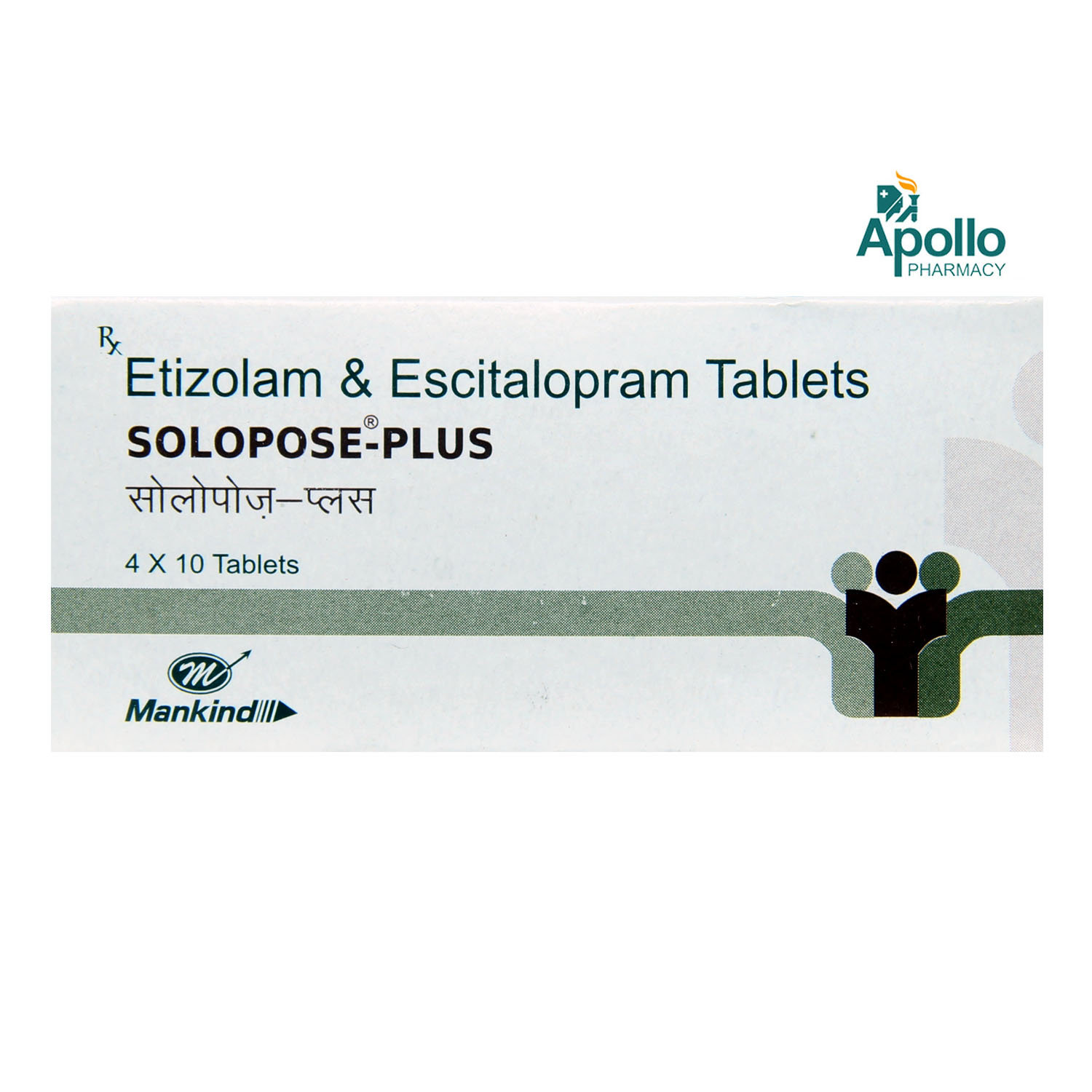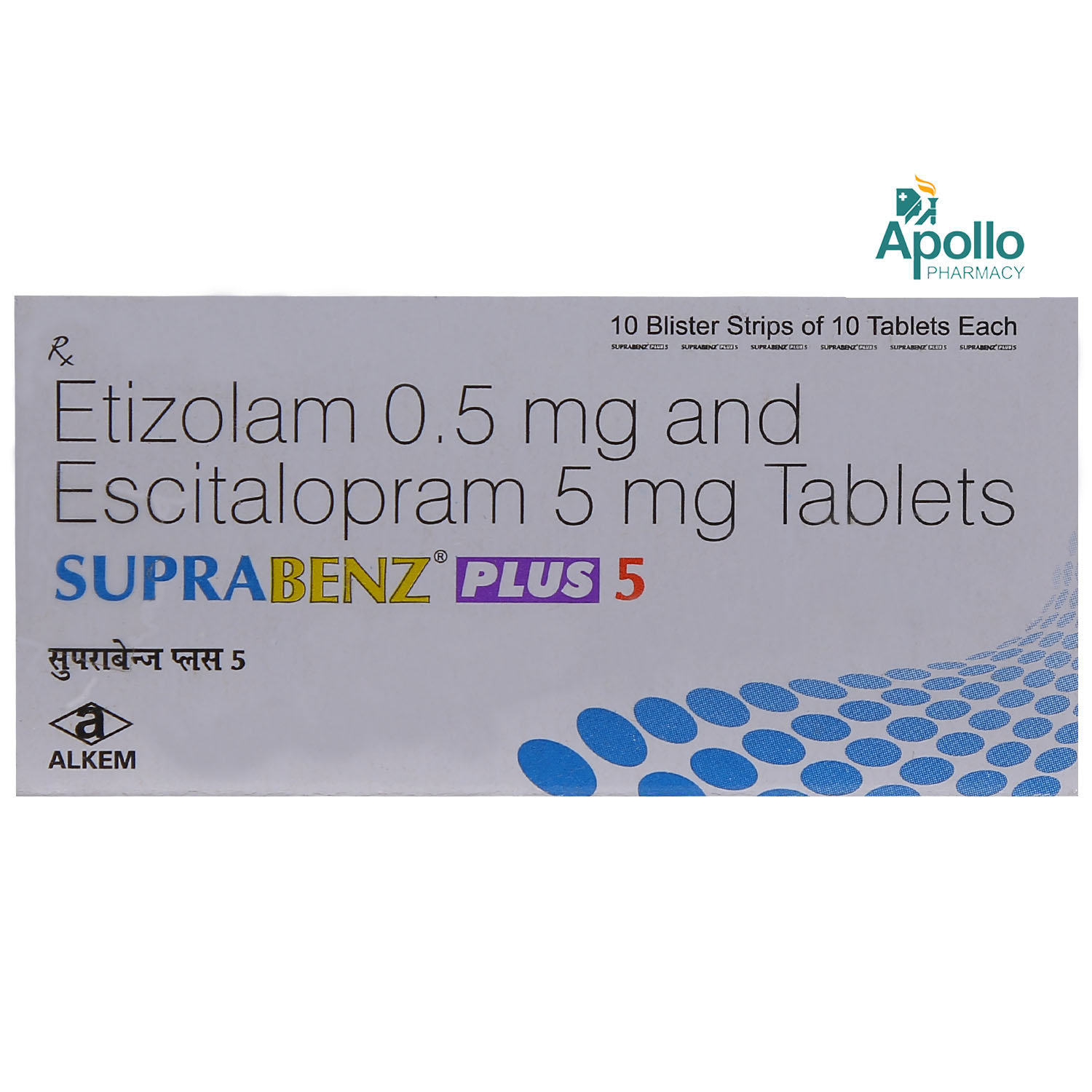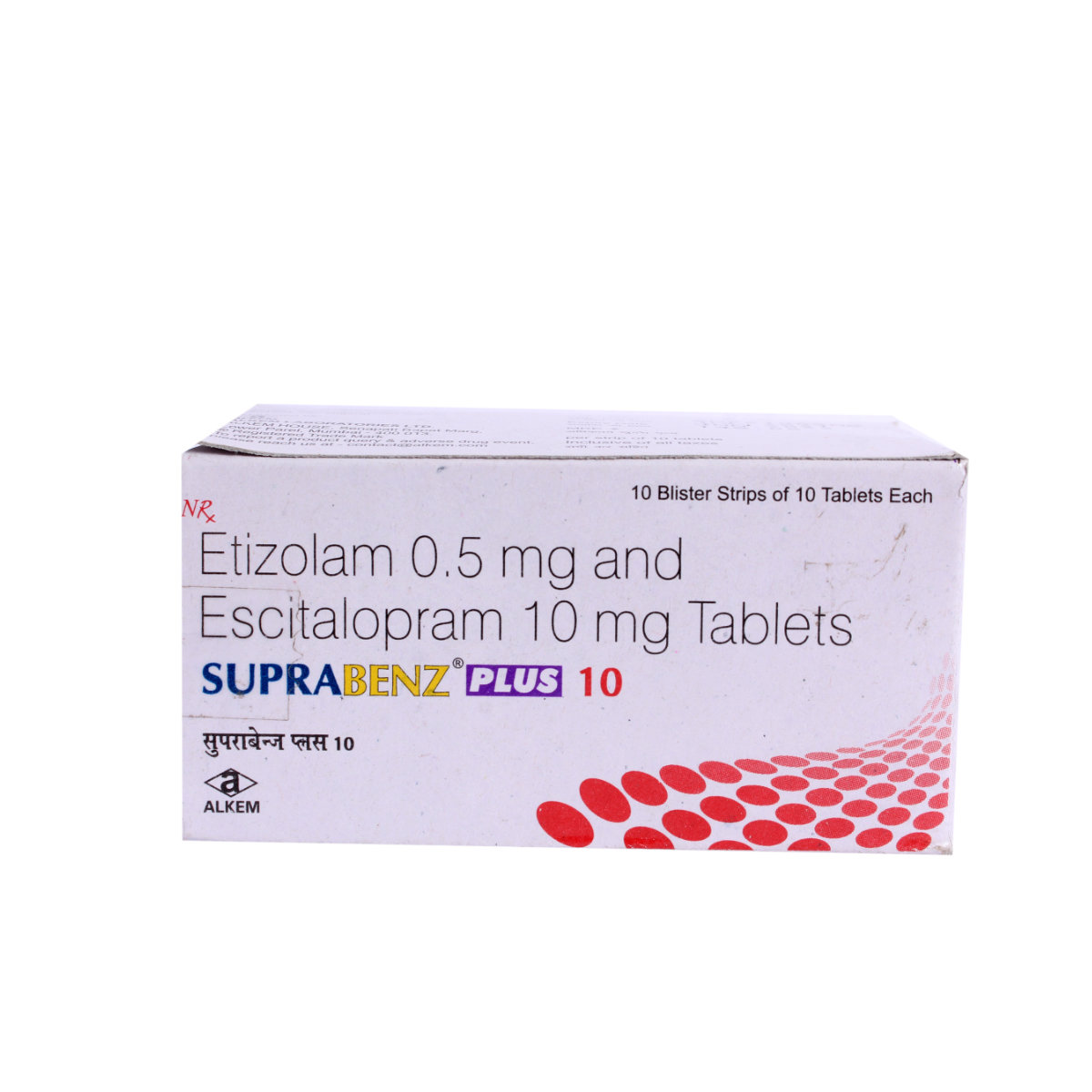Etizolam+escitalopram
About Etizolam+escitalopram
Escitalopram+etizolam comes into the category of medicines known as 'antidepressants', primarily used to treat depression and other mental health conditions, including anxiety, panic disorder, and obsessive-compulsive disorder. Depression is a mood disorder that affects day to day life of a person. A person may have symptoms such as feeling sad or feeling lost and might have mood swings. Anxiety is defined as an emotion characterized by feelings of tension, worried thoughts, and symptoms like increased blood pressure. Anxiety disorder also includes panic disorder which is characterized by sudden feelings of terror. In Obsessive-compulsive disorder (OCD), a person feels the need to think or perform things repeatedly.
Escitalopram+etizolam compromises of two medicines, namely: Escitalopram and Etizolam. Escitalopram comes into the category of medications known as 'selective serotonin reuptake inhibitors, or SSRIs', and works by increasing serotonin levels. Serotonin is a chemical messenger in the brain responsible for improving mood and physical symptoms of depression. It is also responsible for relieving symptoms of anxiety, panic attacks, and obsessive-compulsive disorders. Etizolam comes into the category of 'benzodiazepine (BDZ)', which works by increasing the activity of GABA (a chemical messenger in the brain that acts as a natural nerve-calming agent) and is involved in inducing sleep. Thereby, Escitalopram+etizolam relaxes muscles, reduces anxiety, and helps to fall asleep.
You can take Escitalopram+etizolam with or without food. It should be swallowed whole with a glass of water. Do not chew, bite, or break it. Your doctor will advise you on how often you take your tablets based on your medical condition. In some cases, you may experience decreased or increased appetite, weight gain, pain, sweating, fatigue, or high fever. Most of these side effects of Escitalopram+etizolam do not require medical attention and gradually resolve over time. However, if the side effects are persistent, reach out to your doctor.
Try not to stop taking Escitalopram+etizolam of your own, as it may lead to unpleasant side effects. Let your doctor know about this, as it may cause withdrawal symptoms. Do not take Escitalopram+etizolam if you have epilepsy (seizure disorder or fits), diabetes, sexual disorders, liver or kidney disease, any heart problems, bleeding or clotting disorders, or are currently taking medicines for depression known as MAO inhibitors (such as Isocarboxazid, Phenelzine, Selegiline), or problems with alcohol or other prescription drugs. Inform your doctor if you are allergic to Escitalopram+etizolam.
Uses of Etizolam+escitalopram
Medicinal Benefits
Escitalopram+etizolam compromises of two medicines, namely: Escitalopram and Etizolam. Escitalopram comes into the category of medications known as 'selective serotonin reuptake inhibitors, or SSRIs', and works by increasing serotonin levels. Serotonin is a chemical messenger in the brain responsible for improving mood and physical symptoms of depression. It is also responsible for relieving symptoms of anxiety, panic attacks, and obsessive-compulsive disorders. Etizolam comes into the category of 'benzodiazepine (BDZ)', which works by increasing the activity of GABA (a chemical messenger in the brain that acts as a natural nerve-calming agent) and is involved in inducing sleep. Thereby, Escitalopram+etizolam relaxes muscles, reduces anxiety, and helps to fall asleep. Both, in combination, provide overcoming depression.
Directions for Use
Storage
Side Effects of Etizolam+escitalopram
- Headache
- Anxiety
- Dizziness
- Yawning
- Tremors
- Restlessness
- Feeling sleepy
- Feeling sick (nausea)
- Abnormal dreams
- Difficulties falling asleep
- Blocked or runny nose (sinusitis)
- Increased or decreased appetite
- A decreased or increased appetite
Drug Warnings
Taking Escitalopram+etizolam should be avoided in patients having epilepsy (Brain disorder in which brain activity becomes abnormal, causing seizures), impaired liver or kidney function, diabetes, decreased level of sodium in the blood, tendency to develop bleedings or bruises easily, patients receiving electroconvulsive treatment, having coronary heart disease, suffering or have suffered from heart problems or have recently had a heart attack, having a low resting heart rate, prolonged severe diarrhoea, and vomiting (Being sick) or using diuretics (water tablets), experiencing a fast or irregular heartbeat, fainting, collapse, or dizziness on standing up, which may indicate abnormal functioning of the heart rate, having or previously had eye problems, such as certain kinds of glaucoma (increased pressure in the eye).
Drug Interactions
Drug-Drug Interactions: Escitalopram+etizolam may interact with anti-depressants such as phenelzine, iproniazid, and tranylcypromine, medicines used to treat Parkinson's disease such as selegiline, drugs that can cause bleeding including antiplatelet drugs like clopidogrel, NSAIDs like ibuprofen, 'blood thinners' like warfarin. However, this is not a complete list of medications. Please contact your doctor.
Food-Drug Interactions: Escitalopram+etizolam may interact with a multi-mineral or other herbal/ayurvedic supplements. So, if you are using any of the OTC items, please tell your doctor.
Drug-Disease Interactions: People affected with bipolar disorder (manic depression), bleeding or blood clotting disorder, drug addiction or suicidal thoughts, liver or kidney disease, seizures, low levels of sodium in your blood, cardiovascular conditions like high blood pressure, chest pain (angina), and coronary artery disease should avoid intake of Escitalopram+etizolam.
Drug-Drug Interactions Checker List:
Safety Advice

Alcohol
cautionTaking alcohol with a Escitalopram+etizolam is not recommended to avoid unpleasant side effects.

Pregnancy
cautionEscitalopram+etizolam is not recommended in pregnancy. However, if you were already taking Escitalopram+etizolam before becoming pregnant, do not stop taking it without consulting your doctor. It can pose a small risk of problems for an unborn baby. Your doctor might prescribe you Escitalopram+etizolam in pregnancy depending upon your condition, as it is important to stay well in pregnancy.

Breast Feeding
cautionEscitalopram+etizolam passes into breast milk in minimal amounts and might cause side effects in breastfed babies. It can be prescribed if the baby is healthy. However, if after taking Escitalopram+etizolam, the baby isn't feeding well as usual or is sleeping a lot more than normal, please consult your doctor.

Driving
cautionDriving after taking Escitalopram+etizolam is not recommended as it may cause drowsiness and interfere with your driving ability.

Liver
cautionEscitalopram+etizolam to be taken with caution, especially if you have a history of liver diseases/conditions. The dose may have to be adjusted by your doctor. Please consult your doctor.

Kidney
cautionEscitalopram+etizolam to be taken with caution, especially if you have a history of kidney diseases/conditions as dose adjustment might be required. Please consult your doctor.

Children
unsafeEscitalopram+etizolam is not recommended in children below 12 years of age.
Habit Forming
Diet & Lifestyle Advise
- Regular exercise can help lower anxiety by releasing endorphins and improving your sleep.
- Find humour in your daily life. Try to watch light-hearted shows to help relieve stress.
- You can try increasing your mindfulness by including yoga, meditation, mindfulness-based cognitive therapy, and mindfulness-based stress reduction.
- Drink enough water to stay hydrated, and limit or avoid alcohol and caffeine to relieve anxiety.
- Include a diet rich in whole grains, vegetables, and fruits. This is a healthier option than eating many simple carbohydrates in processed foods.
- Herbs like turmeric, ginger, and chamomile contain anti-inflammatory properties. Including these stuff in meals can reduce inflammation caused due to anxiety disorder.
- Reduce your alcohol, caffeine, added sugar, high salt, and high fat intake. Especially transfat may help also help reduce inflammation.
- You can include antioxidants in your daily diet, like ashwagandha, omega-3 fatty acids, green tea, and lemon balm.
- Try to spend time with your friends and family. Having a strong social network may help you lower your risk of anxiety.
Special Advise
- Escitalopram+etizolam causes drowsiness. Avoid doing activities that require your complete focus and attention, like driving when on this drug.
- An abrupt stoppage of Escitalopram+etizolam can lead to significant withdrawal symptoms. Always discuss with your doctor about decreasing the dosage before completely stopping its usage.
- Avoid consuming alcohol while on this medication, as it can lead to dangerous side effects.
- Escitalopram+etizolam is unsafe for usage if you're pregnant or are planning to get pregnant. Discuss with your doctor in such situations about changing/replacing the medicine with safer alternatives.
Patients Concern
Disease/Condition Glossary
Depression: It is a mood disorder that affects day to day life of a person. A person may have symptoms such as feeling sad or feeling of lost and might have mood swings. Conditions that may worsen in persons facing depression include arthritis, asthma, cardiovascular disease, cancer, diabetes and obesity.
Anxiety: It is defined as an emotion characterized by feelings of tension, worried thoughts, and symptoms like increased blood pressure. Anxiety disorder also includes panic disorder which is characterized by sudden feelings of terror.
Obsessive-compulsive disorder (OCD): In this disorder, a person feels the need to think or perform things repeatedly.
FAQs
Escitalopram+etizolam compromises of two medicines, namely: Escitalopram and Etizolam. Escitalopram comes into the category of medications known as 'selective serotonin reuptake inhibitors, or SSRIs', and works by increasing serotonin levels. Serotonin is a chemical messenger in the brain responsible for improving mood and physical symptoms of depression. It is also responsible for relieving symptoms of anxiety, panic attacks, and obsessive-compulsive disorders. Etizolam comes into the category of 'benzodiazepine (BDZ)', which works by increasing the activity of GABA (a chemical messenger in the brain that acts as a natural nerve-calming agent) and is involved in inducing sleep. Thereby, Escitalopram+etizolam relaxes muscles, reduces anxiety, and helps to fall asleep.
$nme does not affect any contraception, including emergency pills or combined pill.
It takes about 2-4 weeks before you start feeling better. It is advised not to stop this medicine without consulting your doctor as may lead to unpleasant side-effects.
Escitalopram+etizolam is not advised in cases if a person is allergic to Escitalopram+etizolam, has epilepsy (seizure disorder or fits), diabetes, sexual disorders, liver or kidney disease, any heart problems, bleeding or clotting disorders, or are currently taking medicines for depression known as MAO inhibitors (such as Isocarboxazid, Phenelzine, Selegiline), or problems with alcohol or other prescription drugs. It should not be given to a person having a low heart rate along with symptoms of diarrhoea and vomiting, pregnant women, trying to get pregnant, breastfeeding, having eye problems such as glaucoma. In diabetics, it can cause difficulty in keeping stable blood sugar levels.
Certain side-effects of Escitalopram+etizolam can be dealt with simple tips such as if you experience dry mouth, you can chew sugar-free gum or take sugar-free sweets. If you are sweating a lot while taking Escitalopram+etizolam, wear loose clothing, and use a strong antiperspirant. If you cannot sleep after taking Escitalopram+etizolam, prefer to take it in the morning to avoid sleep disturbances. If you feel sleepy after taking Escitalopram+etizolam, avoid taking it in the evening and limit your alcohol intake. If you feel tired or weak after taking Escitalopram+etizolam, sit or lie down until you feel better. If you feel that the side-effects are worsening, please consult your doctor.
Taking Escitalopram+etizolam in more than the recommended dose can cause unpleasant side-effects such as dizziness, tremor, agitation, convulsion, coma, nausea, vomiting, changes in heart rhythm, decreased blood pressure, and change in body fluid/salt balance.
Initially, Escitalopram+etizolam can make you feel less hungry, which can make you lose weight. After some days, you might gain weight as your appetite returns. If you experience too much weight loss or gain, please consult your doctor.
Escitalopram+etizolam should be taken as per the advice of your doctor. Once you start feeling better, you might have to continue it for several months to prevent returning symptoms. Your doctor will advise you on how much time you need to continue Escitalopram+etizolam depending upon your symptoms' type and severity.
Escitalopram+etizolam should be preferably taken in the morning as taking it at night can keep you awake till late. It is better to take it at a fixed time.
In case you miss a dose of Escitalopram+etizolam, do not take a double dose of Escitalopram+etizolam. If you remember the missed dose before sleeping, take it at that time and take Escitalopram+etizolam at the same time the next day, which were you taking earlier. If you remember the missed dose the next day, leave the skipped dose, and continue with the next dose.
Yes, it is essential to inform your doctor if you plan to get pregnant and are taking Escitalopram+etizolam. It is not advised to take this medicine in pregnancy as it might pose a risk to the unborn baby. However, please consult your doctor before you stop taking Escitalopram+etizolam as the sudden stoppage of this medicine can lead to unpleasant side-effects.
Escitalopram+etizolam may make you feel dizzy or drowsy, so consuming marijuana (cannabis) will worsen these side effects.






